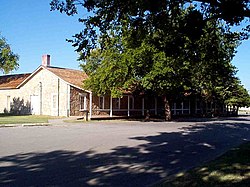Fort Sill, Oklahoma
| Fort Sill, Oklahoma | |
|---|---|
| Lawton, Comanche County, Oklahoma | |
   
Shoulder sleeve insignia of units stationed at Fort Sill
|
|
| Coordinates | 34°42′15″N 98°30′30″W / 34.70417°N 98.50833°WCoordinates: 34°42′15″N 98°30′30″W / 34.70417°N 98.50833°W |
| Type | Military post |
| Site information | |
| Controlled by | United States |
| Site history | |
| Built | 1869 |
| In use | 1869–present |
| Garrison information | |
| Past commanders |
MG Mark McDonald |
| Garrison |
United States Army Field Artillery School United States Army Air Defense Artillery School 75th Fires Brigade 31st Air Defense Artillery Brigade |
|
Fort Sill, Oklahoma
|
|

Old infantry barracks at Fort Sill.
|
|
| Location | Lawton, Oklahoma |
| Architect | US Army |
| NRHP Reference # | 66000629 |
| Significant dates | |
| Added to NRHP | October 15, 1966 |
| Designated NHL | 19 December 1960 |
Fort Sill, Oklahoma is a United States Army post north of Lawton, Oklahoma, about 85 miles southwest of Oklahoma City.
Today, Fort Sill remains the only active Army installation of all the forts on the Southern Plains built during the Indian Wars. It is designated as a National Historic Landmark and serves as home of the United States Army Field Artillery School as well as the Marine Corps' site for Field Artillery MOS school, United States Army Air Defense Artillery School, the 31st Air Defense Artillery Brigade, and the 75th Fires Brigade. Fort Sill is also one of the four locations for Army Basic Combat Training. It has played a significant role in every major American conflict since 1869.
The site of Fort Sill was staked out on 8 January 1869 (factual evidence of actual date needed), by Maj. Gen. Philip H. Sheridan, who led a campaign into Indian Territory to stop hostile tribes from raiding border settlements in Texas and Kansas.
Sheridan's massive winter campaign involved six cavalry regiments accompanied by frontier scouts such as Buffalo Bill Cody, Wild Bill Hickok, Ben Clark and Jack Stilwell. Troops camped at the location of the new fort included the 7th Cavalry, the 19th Kansas Volunteers and the 10th Cavalry, a distinguished group of black "buffalo soldiers" who constructed many of the stone buildings still surrounding the old post quadrangle.
...
Wikipedia


